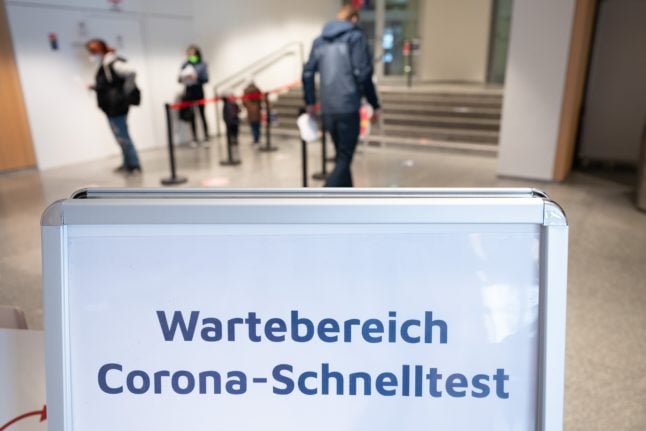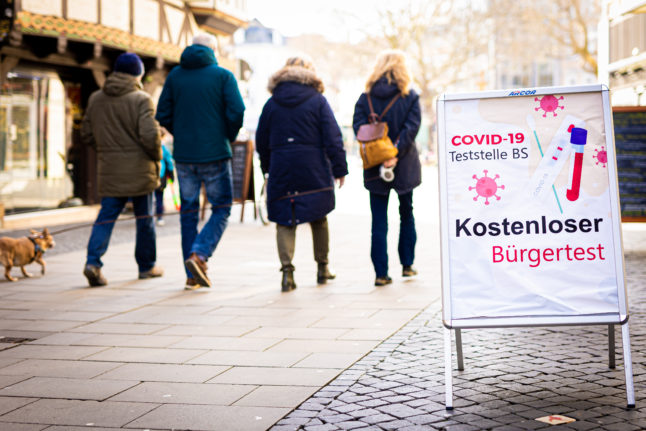The Schnelltests – rapid tests – were brought in back in March 2021 as a way of monitoring infections while relaxing some Covid restrictions after the tougher winter 2020/21 shutdown that lasted months. The tests have been taxpayer-funded since then – except for a few weeks in October 2021 when the government decided to stop offering free tests to the general public (bar a few exceptions) in a bid to encourage more vaccinations.
However, since that was reversed, people in Germany – including tourists – have been able to quite easily get at least one antigen test per week, and sometimes more depending on the region. The tests are also known as Bürgertests (although they are for everyone, not just citizens).
They obviously help people to monitor their infection status especially before and after socialising so are a useful tool in the pandemic.
They are also used to show when people can get a PCR test. Under the new prioritisation rules, people in at risk groups – like medical staff – can get a free PCR test if they have symptoms, while others have to show a positive antigen test result first.
Why would we get rid of them then?
The German government last week voted through new slimmed down Covid legislation that means most rules – including the ‘G’ entry rules to places like restaurants and bars – can be lifted. Okay – German states have decided to extend these rules for around two weeks and they can have tougher rules again if the situation gets worse, but overall the message is clear – it’s time for Germany to try and let go of some of these measures.
READ ALSO: EXPLAINED: The Covid measures across German states
The G rules mean that people need a test to do things in public. For instance, under 3G rules, unvaccinated people need to show proof of a negative test to go and eat in a restaurant.
But without these restrictions in place, the need for them to be taxpayer funded becomes questionable.
Another issue is that they are very costly. Up to October last year, they had cost the taxpayer €4 billion.
And last week Health Minister Karl Lauterbach said there are plans to raise health insurance contributions to address a massive deficit. Basically – the pandemic is costing – unsurprisingly – a lot.
Are there concrete plans to end free rapid tests?
Lots of people have been talking about when antigen tests will no longer be free because the current corona test regulation expires at the end of March. Berlin mayor Franziska Giffey told broadcaster rbb24 recently that the many testing centres using federal funding would likely not be sustainable, and told Berliners to “no longer expect to see so many test sites in the city”.
But this week it emerged that the government is looking to extend the free testing – at least for a couple of months.
A spokesman from the Health Ministry told The Local that tests will continue to be paid for by the government, and that the Health Ministry is “preparing a corresponding ordinance”.
“This time, the ordinance will be valid until the end of May,” said the spokesman.
According to a draft proposal, the Health Ministry says the extension of free testing is happening “in view of the continuing infection caused by the Omicron variant”.
However, a further extension is not planned, with hopes that the spring/summer season will lead to a reduction in virus transmission.
Furthermore, data from Germany and abroad suggests that infections with the Omicron variant are associated with a lower severity of illness.
“Therefore, a permanent validity of the prescription and the assumption of costs by the federal government and thus the taxpayer is no longer appropriate,” said the Ministry in a draft proposal.
What does this mean for test centres?
As free testing will continue for a while longer, many will remain but some will likely close.
The Associations of Statutory Health Insurance Physicians (KVs) in Thuringia and Hesse have already announced that they would close their Covid test centres at the end of March, according to some reports.
READ ALSO: When will Germany’s Covid travel restrictions be lifted?

Does this affect PCR tests?
There are no plans to change the rules around PCR tests, which are considered the most reliable in detecting Covid infections. They are free of charge to people who need them or for people with a positive rapid test, although a doctor or health official has to give you the go ahead to get one. As we mentioned above, there are some prioritisation rules now that infections are so widespread in Germany.
The government has set up this question and answer page on Covid testing which is helpful (although it’s in German).
What’s the alternative to free rapid tests?
It is likely that some test centres will remain open and offer rapid tests at a cost after May since we are still in the pandemic. At-home Covid tests are also relatively easy to find in supermarkets and drug stores.



 Please whitelist us to continue reading.
Please whitelist us to continue reading.
Member comments